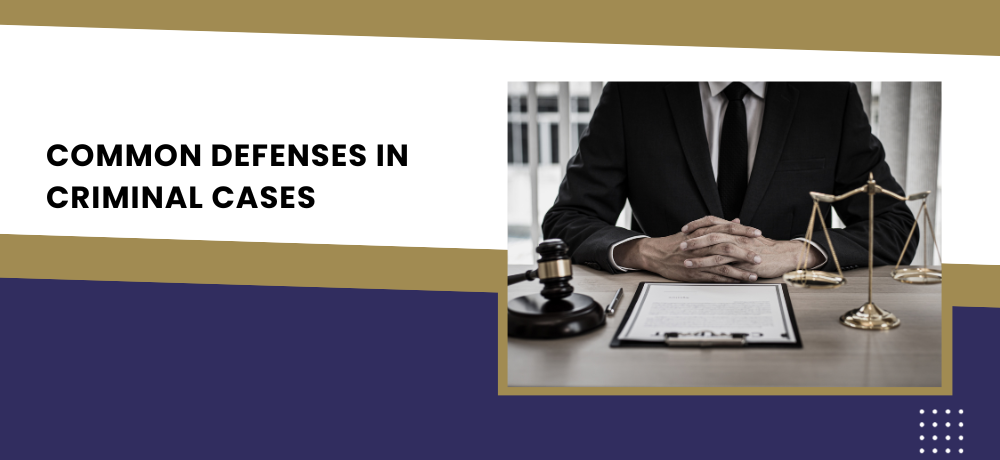Common Defenses in Criminal Cases

Facing criminal charges can be a daunting experience, and understanding the common defences available is crucial. In this blog, we'll explore key strategies that can make a significant difference in your case. As a seasoned legal professional at Joseph Fera Law Office, I've witnessed firsthand the impact these defences can have on the outcome of criminal cases.
Alibi Defense in Criminal Cases: Establishing a Firm Chronological Account
In criminal cases, the alibi defence plays a crucial role in asserting that the accused was not present at the scene of the alleged crime during the time it occurred. This defence relies on building a comprehensive and credible chronological account of the defendant's whereabouts. Attorneys often present a combination of witness testimonies, surveillance footage, and documented activities to create a robust alibi. The effectiveness of this defence hinges on the meticulousness of the timeline and the ability to counteract the prosecution's arguments.
Self-Defense in Criminal Cases: Navigating the Fine Line of Justifiable Force
Self-defence is a well-established legal defence in criminal cases, allowing individuals to justify the use of force when faced with imminent harm. This defence requires a careful examination of the circumstances surrounding the alleged crime. Attorneys working on self-defence cases must meticulously demonstrate that their client's actions were a reasonable response to a perceived threat, emphasizing the proportional nature of the force employed. Success often depends on presenting a compelling narrative that resonates with the jury's understanding of a legitimate threat.
Insanity Defense: Unraveling the Complexities of Mental Competence in Criminal Cases
In criminal cases, the insanity defence introduces the complex issue of mental competence. This defence contends that the accused was not mentally sound at the time of the alleged crime, thereby challenging their criminal responsibility. Attorneys often collaborate with psychiatric experts to provide a thorough examination of the defendant's mental state. The success of this defence relies on establishing a clear link between the defendant's mental condition and their inability to comprehend the nature or wrongfulness of their actions during the criminal incident.
Duress or Coercion Defense: Balancing Act Between Threat and Criminal Act
The duress or coercion defence in criminal cases centers around the concept that the accused committed the crime under the threat of imminent harm. Attorneys employing this defence must convincingly demonstrate that their client reasonably believed they had no alternative but to engage in the illegal act to prevent harm to themselves or others. Success often lies in effectively conveying the immediacy and severity of the threatened harm, thereby justifying the otherwise unlawful actions of the defendant.
Mistaken Identity Defense in Criminal Cases: Challenging Eyewitness Testimonies
Mistaken identity defences in criminal cases involve challenging the accuracy and reliability of eyewitness testimonies. Attorneys aim to create reasonable doubt by presenting evidence that questions the identification of the accused as the perpetrator. This defence often delves into the psychology of eyewitness accounts, emphasizing factors such as poor lighting, stress, or suggestibility that may contribute to misidentifications. The strength of the mistaken identity defence lies in the ability to present a compelling alternative narrative that raises questions about the prosecution's case.
Illegal Search and Seizure Defense: Safeguarding Charter Right in Criminal Cases
The defence of illegal search and seizure is grounded in protecting the defendant's Charter right against unreasonable searches and seizures. Attorneys scrutinize the actions of law enforcement, aiming to establish that the evidence obtained was unlawfully acquired. Success in this defence often requires a meticulous analysis of police conduct, court precedents, and constitutional principles. Exclusion of unlawfully obtained evidence can significantly impact the prosecution's case, making the illegal search and seizure defence a potent strategy in criminal litigation.
Navigating criminal charges requires a strategic and informed approach. By understanding these common defences, you'll be better equipped to face legal challenges. If you find yourself in need of professional legal assistance, contact Joseph Fera Law Office today to discuss your case.
Get in touch with us today! To learn more about the services we offer, please click here. To contact us, please click here or call us at (519)822-9163.